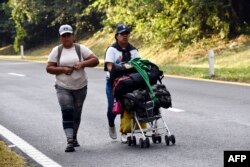U.S. and Mexican officials met Wednesday in Mexico City to discuss how to slow the surge of migrants at the countries’ shared border, where there have been as many as 10,000 illegal crossings into the United States daily in December.
The two sides, led by U.S. Secretary of State Antony Blinken and Mexican President Andrés Manuel López Obrador, met for about two hours.
A senior Biden administration official told reporters that Mexican leaders told the U.S. delegation about new measures Mexico is taking, including cracking down on smugglers who put migrants on trains or buses heading toward the border.
"We were really impressed by some of the new actions that Mexico is taking, and we have seen in recent days a pretty significant reduction in border crossings," the official said.
López Obrador said on social media late Wednesday that "important agreements were reached" to benefit the two countries and their people. He did not detail any specific deals.
He said earlier Wednesday that Mexico is willing to help but that he wants to see progress in U.S. relations with two of the top sources of migrants, Cuba and Venezuela. He also stressed the need for more development aid for the region.
"We have always talked about addressing the causes [of migration]. The ideal thing is to help poor countries," López Obrador said.
U.S. Homeland Security Secretary Alejandro Mayorkas described Wednesday’s talks as "productive."
"The regional challenge of migration requires regional solutions, and we appreciate Mexico’s commitment to continue its efforts alongside us and with others," Mayorkas said on the social media site X formerly known as Twitter.
The critical one-day meeting came as migration numbers have reached record levels. In 2023, more than half a million migrants, many fleeing crime, poverty and regional conflicts, have crossed the Darien Gap jungle into Central America. That is double the number who attempted the trek in 2022.
The surge of arrests at the southwest U.S. border, with 10,000 migrants trying to cross each day, has strained the U.S. Customs and Border Protection agency.
On December 18, the United States briefly closed a pair of rail crossings with Mexico, citing migrants’ use of freight trains to travel to areas near the border and the need to redirect CBP personnel to assist the U.S. Border Patrol with taking migrants into custody.
Mexican Foreign Relations Secretary Alicia Bárcena said after the meeting that it was important for Mexico to get the United States to reopen border crossings.
"We spoke about the importance of the border, and about the economic relationship ... the importance of reopening the border crossings, that is a priority for us," Bárcena said.
Before the meeting, Blinken’s office said he would "discuss unprecedented irregular migration in the Western Hemisphere and identify ways Mexico and the United States will address border security challenges, including actions to enable the reopening of key ports of entry across our shared border."
The migration crisis has become a roadblock for U.S. President Joe Biden. Congressional Republicans have made changes to immigration law a condition for passing legislation that includes U.S. military support for Ukraine, as well as Israel and Taiwan.
Also Wednesday, about 6,000 migrants and asylum-seekers, including small children, continued their slow march north from southern Mexico in a caravan hoping to reach the U.S. border.
Mexican authorities also moved to clear a migrant encampment along the border in Matamoros, across the Rio Grande River from Brownsville, Texas.
Some information for this report came from The Associated Press, Agence France-Presse and Reuters.







